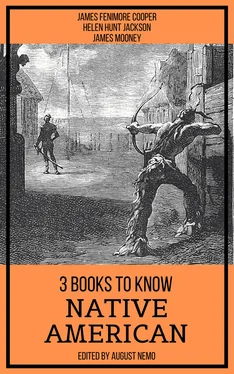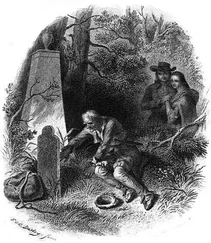20 Baron Dieskau, a German, in the service of France. A few years previous to the period of the tale, this officer was defeated by Sir William Johnson of Johnstown, New York, on the shores of Lake George. See Appendix, Note H.
“’Twas a noble repulse!” exclaimed Heyward, in the heat of his youthful ardor; “the fame of it reached us early, in our southern army.”
“Ay! but it did not end there. I was sent by Major Effingham, at Sir William’s own bidding, to outflank the French, and carry the tidings of their disaster across the portage, to the fort on the Hudson. Just hereaway, where you see the trees rise into a mountain swell, I met a party coming down to our aid, and I led them where the enemy were taking their meal, little dreaming that they had not finished the bloody work of the day.”
“And you surprised them?”
“If death can be a surprise to men who are thinking only of the cravings of their appetites. We gave them but little breathing time, for they had borne hard upon us in the fight of the morning, and there were few in our party who had not lost friend or relative by their hands. When all was over, the dead, and some say the dying, were cast into that little pond. These eyes have seen its waters colored with blood, as natural water never yet flowed from the bowels of the ‘arth.”
“It was a convenient, and, I trust, will prove a peaceful grave for a soldier. You have, then, seen much service on this frontier?”
“I!” said the scout, erecting his tall person with an air of military pride; “there are not many echoes among these hills that haven’t rung with the crack of my rifle, nor is there the space of a square mile atwixt Horican and the river, that ‘Killdeer’ hasn’t dropped a living body on, be it an enemy or be it a brute beast. As for the grave, there, being as quiet as you mention, it is another matter. There are them in the camp who say and think, man, to lie still, should not be buried while the breath is in the body; and certain it is that in the hurry of that evening, the doctors had but little time to say who was living and who was dead. Hist! see you nothing walking on the shore of the pond?”
“’Tis not probable that any are as houseless as ourselves, in this dreary forest.”
“Such as he may care but little for house or shelter, and night dew can never wet a body that passes its days in the water,” returned the scout, grasping the shoulder of Heyward with such convulsive strength as to make the young soldier painfully sensible how much superstitious terror had got the mastery of a man usually so dauntless.
“By heaven! there is a human form, and it approaches! Stand to your arms, my friends; for we know not whom we encounter.”
“Qui vive?” demanded a stern, quick voice, which sounded like a challenge from another world, issuing out of that solitary and solemn place.
“What says it?” whispered the scout; “it speaks neither Indian nor English!”
“Qui vive?” repeated the same voice, which was quickly followed by the rattling of arms, and a menacing attitude.
“France!” cried Heyward, advancing from the shadow of the trees to the shore of the pond, within a few yards of the sentinel.
“D’où venez-vous — où allez-vous, d’aussi bonne heure?” demanded the grenadier, in the language and with the accent of a man from old France.
“Je viens de là découverte, et je vais me coucher.”
“Etes-vous officier du roi?”
“Sans doute, mon camarade; me prends-tu pour un provincial! Je suis capitaine de chasseurs (Heyward well knew that the other was of a regiment in the line); j’ai ici, avec moi, les filles du commandant de là fortification. Aha! tu en as entendu parler! je les ai fait prisonnières près de l’autre fort, et je les conduis au général.”
“Ma foi! mesdames; j’en suis faché pour vous,” exclaimed the young soldier, touching his cap with grace; “mais — fortune de guerre! vous trouverez notre général un brave homme, et bien poli avec les dames.”
“C’est le caractère des gens de guerre,” said Cora, with admirable self-possession. “Adieu, mon ami; je vous souhaiterais un devoir plus agréable à remplir.”
The soldier made a low and humble acknowledgment for her civility; and Heyward adding a “Bonne nuit, mon camarade,” they moved deliberately forward, leaving the sentinel pacing the banks of the silent pond, little suspecting an enemy of so much effrontery, and humming to himself those words, which were recalled to his mind by the sight of women, and perhaps by recollections of his own distant and beautiful France —
“Vive le vin, l’amour,” etc., etc.
“’Tis well you understood the knave!” whispered the scout, when they had gained a little distance from the place, and letting his rifle fall into the hollow of his arm again; “I soon saw that he was one of them uneasy Frenchers; and well for him it was that his speech was friendly and his wishes kind, or a place might have been found for his bones among those of his countrymen.”
He was interrupted by a long and heavy groan which arose from the little basin, as though, in truth, the spirits of the departed lingered about their watery sepulchre.
“Surely it was of flesh!” continued the scout; “no spirit could handle its arms so steadily!”
“It was of flesh; but whether the poor fellow still belongs to this world may well be doubted,” said Heyward, glancing his eyes around him, and missing Chingachgook from their little band. Another groan more faint than the former, was succeeded by a heavy and sullen plunge into the water, and all was as still again as if the borders of the dreary pool had never been awakened from the silence of creation. While they yet hesitated in uncertainty, the form of the Indian was seen gliding out of the thicket. As the chief rejoined them, with one hand he attached the reeking scalp of the unfortunate young Frenchman to his girdle, and with the other he replaced the knife and tomahawk that had drunk his blood. He then took his wonted station, with the air of a man who believed he had done a deed of merit.
The scout dropped one end of his rifle to the earth, and leaning his hands on the other, he stood musing in profound silence. Then shaking his head in a mournful manner, he muttered —
“‘T would have been a cruel and an unhuman act for a white-skin; but ’tis the gift and natur’ of an Indian, and I suppose it should not be denied. I could wish, though, it had befallen an accursed Mingo, rather than that gay young boy from the old countries.”
“Enough!” said Heyward, apprehensive the unconscious sisters might comprehend the nature of the detention, and conquering his disgust by a train of reflections very much like that of the hunter; “’tis done; and though better it were left undone, cannot be amended. You see we are, too obviously, within the sentinels of the enemy; what course do you propose to follow?”
“Yes,” said Hawkeye, rousing himself again, “’tis as you say, too late to harbor further thoughts about it. Ay, the French have gathered around the fort in good earnest, and we have a delicate needle to thread in passing them.”
“And but little time to do it in,” added Heyward, glancing his eyes upward, toward the bank of vapor that concealed the setting moon.
“And little time to do it in!” repeated the scout. “The thing may be done in two fashions, by the help of Providence, without which it may not be done at all.”
“Name them quickly, for time presses.”
“One would be to dismount the gentle ones, and let their beasts range the plain; by sending the Mohicans in front, we might then cut a lane through their sentries, and enter the fort over the dead bodies.”
“It will not do — it will not do!” interrupted the generous Heyward; “a soldier might force his way in this manner, but never with such a convoy.”
Читать дальше












